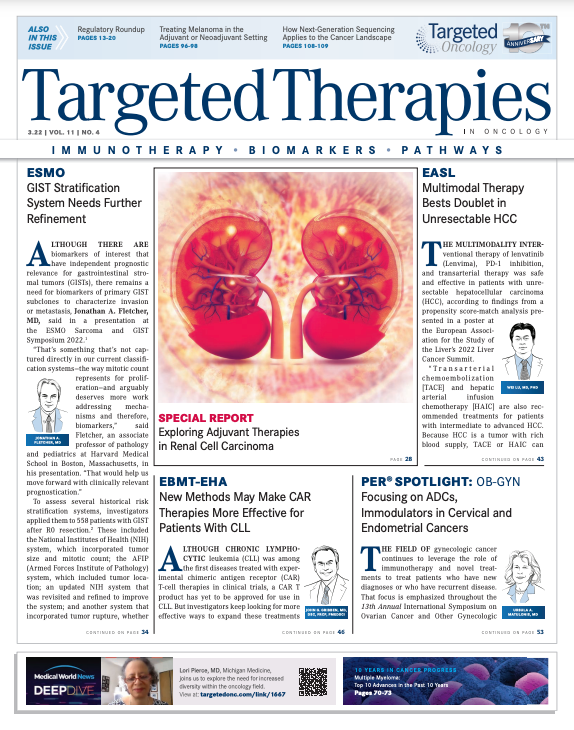Targeted Therapy Is Considered a Necessity for Metastatic GIST
Targeted therapy with tyrosine kinase inhibitors is necessary after surgery for patients with metastatic gastrointestinal stromal tumors with residual disease requiring resection to prevent disease recurrence.
Carol Swallow, MD, FRCSC

Targeted therapy with tyrosine kinase inhibitors (TKIs) is necessary after surgery for patients with metastatic gastrointestinal stromal tumors (GIST) with residual disease requiring resection to prevent disease recurrence, according to Carol Swallow, MD, FRCSC.1
At the 2022 European Society for Medical Oncology (ESMO) Sarcoma and GIST Symposium, Swallow, a surgical oncologist at Princess Margaret Hospital and a member of the Division of General Surgery at Mount Sinai Hospital in Toronto, Canada, debated the benefit of surgery in metastatic disease and the use of TKIs in the perioperative setting. She maintained that resection alone without continuing TKI therapy is “not adequate treatment” and sought to prove the necessity of both surgery and TKI therapy through various levels of evidence.
Prior to the standard use of imatinib (Gleevec), data from a Memorial Sloan Kettering Cancer Center study showed very poor survival for patients with metastatic and recurrent GIST who had a resection alone.2 Findings from an additional study from Poland of patients with initially inoperable and/or metastatic GIST showed that recurrences were common in patients who did not receive imatinib after surgery.3 Of 32 patients included in the study, 5 patients did not receive further imatinib therapy and 4 had recurrent disease, resulting in a lower progression-free survival (PFS) for this subgroup. “So it has become standard to continue the imatinib,” Swallow said.
She emphasized that upfront cytoreduction is not useful for patients. In a retrospective study of 249 patients with advanced GIST who either did or did not receive cytoreduction prior to the start of imatinib, the investigators found that cytoreduction prior to imatinib did not improve the prognosis of these patients.4 Both PFS ( P = .056) and overall survival (OS; P = .164) were similar regardless of surgical resection or not.
“The controversy continues, though, about patients who have responded to TKI therapy and whether they should be offered what we call adjuvant surgery. Does this type of resection in this setting benefit them?” she added.
Swallow highlighted 3 randomized, controlled trials that addressed this controversy.
In a multicenter trial from China, patients with recurrent or metastatic GIST and residual disease were randomized to surgery or imatinib treatment alone. In those who underwent surgery, the 2-year PFS rate was 88.4% compared with 57.7% in the imatinib-alone arm (P = .089). The median OS was not reached in the surgery arm and was 49 months in the imatinib arm (P = .024).5 However, the trial had poor accrual and closed early.
An earlier, smaller study of patients with GIST and liver metastases treated with either neoadjuvant therapy, resection, and adjuvant therapy or imatinib alone, showed a significant difference in OS (P = .03).6
Meta-analyses also indicated improved survival for patients with advanced GIST who underwent surgery alone compared with surgery following TKI administration. In one such analysis of more than 650 patients with advanced GIST, surgical resection following TKI was associated with both improved PFS (HR, 2.08; 95% CI, 1.58-2.76; P < .001) and OS (HR, 2.13; 95% CI, 1.59-2.85; P < .001).7
A retrospective analysis of the Spanish Group for Research on Sarcoma (GEIS) looked at 171 patients with locally advanced or metastatic GIST. The median survival was 59.9 months for those treated with imatinib alone and 87.6 months for those treated with imatinib and metastasectomy (HR for OS by multivariate analysis, 0.47; 95% CI, 0.24-0.90; P = .022).8
“The baseline features of these patients were not similar, and this is representative of many of these observational studies,” Swallow said.
An analysis of 323 patients with metastatic GIST suggested that certain prognostic factors affected survival outcomes with surgery.9 Those who had positive margins from surgery (HR, 1.85; 95% CI, 1.19-2.87; P = .006) or multifocal progressive disease (HR, 3.08; P = .001) had worse PFS outcomes. Radiographic response to TKI therapy at the time of surgery also influenced PFS. Patients who were responsive to TKI therapy had a median PFS of 31 months, 19 months for stable disease, 10 months in the case of unifocal progression, and 5 months for multifocal progression (P < .001). Regarding TKI, patients treated with imatinib had improved PFS compared with either sunitinib or other TKI therapy, regardless of radiographic response.
Swallow emphasized that surgery is still necessary to manage residual disease after TKI therapy to eliminate resistant clones and delay the time to next treatment in patients who are considered good candidates for resection. Clinical practice guidelines for GIST also recommend the use of surgery for residual disease following response to imatinib therapy, followed by further imatinib after surgical resection.10
However, Swallow reminded the audience that patient selection is critical and should be guided by response status and performance status.
REFERENCES:
1. Swallow C. The management of residual disease after TKIs in GIST. Presented at: 2022 ESMO Sarcoma and GIST Symposium; January 31-February2, 2022; Virtual.
2. Mudan SS, Conlon KC, Woodruff JM, Lewis JJ, Brennan MF. Salvage surgery for patients with recurrent gastrointestinal sarcoma: prognostic factors to guide patient selection. Cancer. 2000;88(1):66-74. doi:10.1002/(sici)1097-0142(20000101)88:1<66::aid-cncr10>3.0.co;2-0
3. Rutkowski P, Nowecki Z, Nyckowski P, et al. Surgical treatment of patients with initially inoperable and/or metastatic gastrointestinal stromal tumors (GIST) during therapy with imatinib mesylate. J Surg Oncol. 2006;93(4):304-311. doi:10.1002/jso.20466
4. An HJ, Ryu MH, Ryoo BY, et al. The effects of surgical cytoreduction prior to imatinib therapy on the prognosis of patients with advanced GIST. Ann Surg Oncol. 2013;20(13):4212-4218. doi:10.1245/s10434-013-3279-9
5. Du CY, Zhou Y, Song C, et al. Is there a role of surgery in patients with recurrent or metastatic gastrointestinal stromal tumours responding to imatinib: a prospective randomised trial in China. Eur J Cancer. 2014;50(10):1772-1778. doi:10.1016/j.ejca.2014.03.280
6. Xia L, Zhang MM, Ji L, Li X, Wu XT. Resection combined with imatinib therapy for liver metastases of gastrointestinal stromal tumors. Surg Today. 2010;40(10):936-942. doi:10.1007/s00595-009-4171-x
7. Guo Y, Liu J, Wang F, et al. The role of surgical resectionfollowing tyrosine kinase inhibitors treatment in patients with advanced gastrointestinal stromal tumors: a systematic review and meta-analysis. J Cancer. 2019;10(23):5785-5792. doi:10.7150/jca.30040
8. Rubió-Casadevall J, Martinez-Trufero J, Garcia-Albeniz X, et al; Spanish Group for Research on Sarcoma (GEIS). Role of surgery in patients with recurrent, metastatic, or unresectable locally advanced gastrointestinal stromal tumors sensitive to imatinib: a retrospective analysis of the Spanish Group for Research on Sarcoma (GEIS). Ann Surg Oncol. 2015;22(9):2948-2957. doi:10.1245/s10434-014-4360-8
9. Fairweather M, Balachandran VP, Li GZ, et al. Cytoreductive surgery for metastatic gastrointestinal stromal tumors treated with tyrosine kinase inhibitors: a 2-institutional analysis. Ann Surg. 2018;268(2):296-302. doi:10.1097/SLA.0000000000002281
10. Casali PG, Blay JY, Abecassis N, et al; ESMO Guidelines Committee, EURACAN, and GENTURIS. Gastrointestinal stromal tumours: ESMO–EURACAN–GENTURIS clinical practice guidelinesfor diagnosis, treatment and follow-up. Ann Oncol. 2022;33(1):20-33. doi:10.1016/j.annonc.2021.09.005
